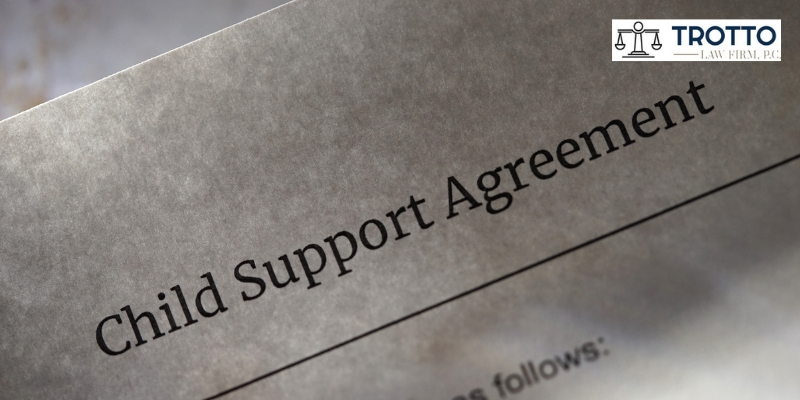Rochester Child Support Attorney
Making sure your Rochester child support lawyer has a thorough understanding of your case, as well as experience with family law, is crucial for receiving the support you need to raise your child. In the Rochester area, no other firm compares to Trotto Law Firm, P.C.’s family law experience, knowledge, and skill.
Family law is a particularly sensitive branch of legal work that impacts the most personal aspects of your family dynamic. Child custody and child support are areas of family law that require the most sensitivity, and the impact that these proceedings have on your children goes beyond the effects of divorce or parental separation.

What Is Child Support?
Child support is a system of financial-related obligations given to a non-custodial parent. Typically paid in monthly lump sums, child support payments are intended to be used for monthly medical expenses, education, and general needs to support a child.
New York’s Child Support Standards Act (CSSA), found in Domestic Relations Law §240(1-b) and Family Court Act §413, sets the formula for determining child support. The current combined parental income cap is $183,000 as of March 1, 2024. Courts apply percentages of combined income when calculating support amounts.
Child support orders in New York can be modified or terminated when there’s a substantial change in circumstances, such as job loss, a significant income shift, or a change in custody. A parent may petition the court to adjust payments, but proof of the substantial change is required.
Although somewhat similar to spousal maintenance, child support payments are directly tied to the welfare of your shared child or children and are independent of spousal maintenance fees. However, spousal maintenance can supplement your childcare expenses. For example, if you have your child enrolled in a tuition-based school system, you can use your monthly child support payments to put towards tuition payments as a form of support.

Enforcement and Special Circumstances
New York courts take child support enforcement seriously. When a parent fails to pay what is outlined in their court order, penalties can include wage garnishment, tax refund interception, driver’s license suspension, and even jail time if they are found in contempt of court. The court can also seize bank accounts or place liens on property to recover overdue support.
In cases involving hidden or underreported income, especially with self-employed parents, a family court judge may calculate imputed income based on one party’s lifestyle, spending, or earning potential. Financial disclosure is mandatory to ensure fairness in the process.
Special situations may extend support beyond age 21, particularly when a child is disabled or dependent. In some cases, support can continue until age 26. Courts may also require contributions toward college tuition, housing, and related educational expenses. These provisions ensure that financial responsibilities reflect each parent’s ability to provide and the child’s ongoing needs.
How Are New York Child Support Payments Determined?
The formula for determining the amount of money paid in child support per month is reliant on two large factors: combined spousal income and the number of children placed in the care of the custodial parents. For one child, 17% of both spouses’ combined income is deemed a reasonable amount to be paid in child support.
For two children, this percentage is increased to 25%. Three children require 29%, and four children would be 31% of that combined income. For five or more children, the minimum percentage of both spouses’ combined income is 35% but can be increased based on the needs of each child involved.
What Contributes to Child Support Payments?
The factors involved in determining child support payments revolve around expense calculations concerning both parents. Ranging from income to general financial responsibilities, these factors go beyond the number of children in need of support. Some of these considerations include:
- Custodial vs. non-custodial delineation. Determining whether you are named the custodial or non-custodial parent of your children is one of the most significant factors in determining your child support payments. Custodial parents take on the responsibility of raising their shared children, and non-custodial parents are those with a more hands-off role in parenting, i.e., supplying child support payments to the custodial parent. Determining this role in your child’s life is the first step toward establishing a child support plan.
- Parent income. The income of both parents is necessary for determining accurate, effective child support payments for your children. Beyond calculations based on combined income and number of children, the amount of income-based support each parent can afford is taken into account when determining child support. For example, if a higher-income parent is named the custodial parent, the parent with the lower income will most likely pay less in monthly support based on calculations made with their joint income,
- Child-related expenses. Depending on your child’s health, education, daycare situation, and general care needs, the financial requirements related to your child support payments may change. For children enrolled in childcare services or tuition-based education, payment for these services is considered when determining monthly child support payments. For medical coverage, depending on the insurance plans of either parent, part of a child support agreement can include healthcare coverage under the non-custodial parent’s insurance provider, which can be factored into monthly payment plans.
- Income disparity between parents. As mentioned previously, the different income levels of each spouse are taken into account when determining child support payments. Both parents’ incomes are added together to calculate the percentage-based size of each payment. In addition, the ability of each parent to provide that calculated payment is taken into account, and it can be adjusted to adequately suit the needs of the child. If one parent makes significantly more than the other, the calculated total, along with the percentage of the monthly obligation fee that each parent is responsible for, reflects this income disparity and can help create an equitable compensation system.
Child support cases are all different, and the factors that affect one case are not applicable in every instance. The obligations of both parents play heavily in the court’s decisions regarding child support, and identifying which person is named the custodial parent is particularly important.
The main factor that contributes to primary custody agreements is the court’s decision regarding which parent is better suited to raise the child. After the establishment of custodial or non-custodial, the process of deciding payment plans for child support can begin.
Are All Child Support Payments in New York the Same?
Due to the specific calculations needed for each child support order, the likelihood of two different cases resulting in the same payment is low. However, the basic math applied in these cases is the same. Although not universal, the process for reaching a comprehensive child support system is similar for each case. Depending on the number of children involved, the amount of money is based on a percentage of the parents’ combined income.
For example, if one parent makes around $60,000 a year and the other parent makes $90,000 a year, their combined income of $150,000 is used to determine monthly child support payments.
For one child, the payment rate is 17% of that income value, which comes out to $2,125. Based on the percentage of the combined income each parent pays, they will then take over the same percentage of the monthly obligation fee. In this example, the parent who makes $90,000 a year would be paying 60% of that monthly fee, which comes out to around $1,275.
Why You Should Hire a Child Support Lawyer
If you are going through a child support dispute, your top priority should be to hire a child support lawyer. With legal representation from a Rochester child support attorney, you can ensure that your case is handled with precision and a focus on protecting your rights and interests. New York’s child support laws are complex and require claims to be backed with evidence. An attorney brings years of experience handling complex cases.
According to CDC data, New York’s divorce rate is about 2.4 divorces per 1,000 people, which means many families across the state rely on child support arrangements to ensure children’s well-being. With an average home value of $508,764 and a weekly wage of $1,833.63, the financial stability of both parties plays a crucial role in support cases.
In Rochester, families in neighborhoods like Park Avenue, Charlotte, and Corn Hill often face the challenges of establishing or modifying child support orders. These matters are handled at the Monroe County Family Court, located in the Hall of Justice at 99 Exchange Blvd, Rochester, NY 14614.
If you have not chosen a law firm to represent you in court, the legal team at Trotto Law Firm, P.C., would be honored to represent you throughout the process. Our trial-ready attorney has practiced family law in the area since 2009. His work has been recognized by the peer-reviewed group Super Lawyers, which has listed him as a rising star from 2014 to 2024.
FAQs
How Much Does a Child Support Lawyer Cost in NY?
The length of your case determines the amount you pay in legal fees and services. Your timeline could vary based on whether your case is contested or uncontested. For an uncontested case, the price of your case is typically lower, with less work going into reaching a verdict. On the other hand, contested cases often cost more money, with more time and effort going into your settlement.
At What Age Does Child Support Stop?
Child support payments can cover children up to 21 years of age, with some restrictions regarding child independence, emancipation, or self-sufficiency beyond parental support. For example, if your child is under the age of 21 but considered “self-sufficient,” whether that be by way of marriage, military service, or emancipation, child support payments will stop based on your child’s ability to provide for themselves.
How Does Child Support Work?
Child support is a system of financial support set up between individual parents, where the non-custodial parent provides monetary support to the custodial parent as both a way to make up for their absence and support the primary caregiver. Based on the number of children shared between both parents, as well as individual financial responsibilities that come with each child, the support system changes to accommodate each situation.
Is There a Statute of Limitations on Child Support?
In New York, the statute of limitations on child support expires 20 years after the default decision made by the court. If a default decision on child support is enforced by the court, and the non-custodial parent does not make the required child support payments by the time the child turns 21, the custodial parent has the right to request child support back payments for up to 20 years past the court decision date.
Finding a Child Support Lawyer for Your Case
As a parent, your primary obligation is to your child, and making sure you can support them is essential to providing them with the care they need. In the event of a divorce, making sure your child is supported during such a stressful time is essential. Child support can provide that necessary peace of mind.
Your child support payments reflect your income, your ex-spouse’s income, and whether you are considered your child’s primary caregiver.
Contact Trotto Law Firm, P.C.
In addition to providing emotional support, competent legal services are crucial for determining the payments needed for your child during a child support case. At Trotto Law Firm, P.C., our experienced legal team is well-versed in child support battles. We can help you compile a comprehensive case and ensure you receive the benefits you need to help raise your child. For a complete list of our practice areas, visit our website and contact us for a consultation today.





